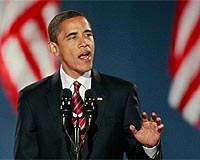| . |  |
. |
Beijing (AFP) Jan 24, 2010 China is expected to further clamp down on rampant lending in the months ahead and possibly even raise interest rates to prevent its blistering economy from overheating, analysts said. The prospects for a fiscal tightening have increased following the release Thursday of data showing the world's third-largest economy expanded by 8.7 percent in 2009 and 10.7 percent in the fourth quarter, analysts said. The fastest quarterly growth rate in two years and the biggest rise in inflation in 13 months has increased the chances of further tightening measures as Beijing seeks to maintain steady economic growth, analysts said. "We expect inflation to continue rising throughout this year, with additional tightening steps including rate hikes," said Citigroup economists Ken Peng and Shen Minggao in a research report. Beijing has already moved this month to calm growing inflationary pressures and the threat of asset bubbles caused by soaraway bank lending, which last year nearly doubled from 2008. The People's Bank of China on Thursday raised the interest rate on its benchmark three-month treasury bills for the second time in two weeks in a bid to deter new lending. It followed an earlier move on its benchmark one-year treasury bills. Chinese banks have been ordered to increase their capital reserves -- effectively limiting the amount of money they can lend out -- amid mounting fears over bad debts as consumers go on a spending spree on property and cars. As economic growth heats up, analysts said they expect policymakers to push reserve ratios even higher and further increase rates on treasury bills before resorting to more aggressive measures such as hiking interest rates. "We look for a minor acceleration in quantitative tightening through lending restrictions and raising the reserve requirement ratio," said Credit Suisse research analyst Tao Dong. Interest rates would likely stay on hold until inflation went above three percent or the US Federal Reserve raised its own rates, Tao said. Raising rates before the US does so may encourage investors to buy the relatively higher-yielding yuan-denominated assets, exacerbating inflation and putting pressure on the yuan to appreciate. China's consumer price index rose 1.9 percent year-on-year in December and analysts expect full-year 2010 inflation to exceed three percent. The index fell 0.7 percent over 2009, with China only emerging from an almost year-long bout of deflation in November. Moody's Economy.com associate economist Alaistair Chan said rumours of an imminent interest rate hike were likely to prove unfounded. "While this is possible, it seems a much more dramatic step than the government is willing to take," he said. But Chan said he expected to see further tightening measures. "These include even higher bill yields, increased bill auctions, higher capital reserve ratios, and public and private discouragement of bank lending. "An increase in interest rates is still expected to happen, but mid-2010 at the earliest," he said. Last week, Premier Wen Jiabao said Beijing was carefully monitoring the risks associated with its hefty pump-priming of last year which included a four trillion yuan (586 billion dollar) stimulus package and state-sanctioned bank lending. Wen's comments appeared to boost the likelihood that China could exit its aggressive stimulus policy and apply the brakes.
Share This Article With Planet Earth
Related Links The Economy
 Obama's plan will unlikely trouble Asia's banks: analysts
Obama's plan will unlikely trouble Asia's banks: analystsHong Kong (AFP) Jan 24, 2010 Plans by US President Barack Obama to curb risk-taking by banks are unlikely to adversely affect Asia's risk-averse financial institutions, analysts said. The proposed measures, which aim to roll back corporate excesses and limit dangerous risk-taking on Wall Street, could even be beneficial to Asia as US banks may have to move their hedge fund businesses to the region, they said. Obama' ... read more |
|
| The content herein, unless otherwise known to be public domain, are Copyright 1995-2009 - SpaceDaily. AFP and UPI Wire Stories are copyright Agence France-Presse and United Press International. ESA Portal Reports are copyright European Space Agency. All NASA sourced material is public domain. Additional copyrights may apply in whole or part to other bona fide parties. Advertising does not imply endorsement,agreement or approval of any opinions, statements or information provided by SpaceDaily on any Web page published or hosted by SpaceDaily. Privacy Statement |